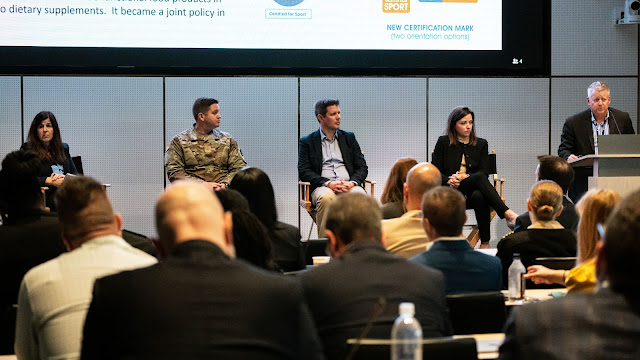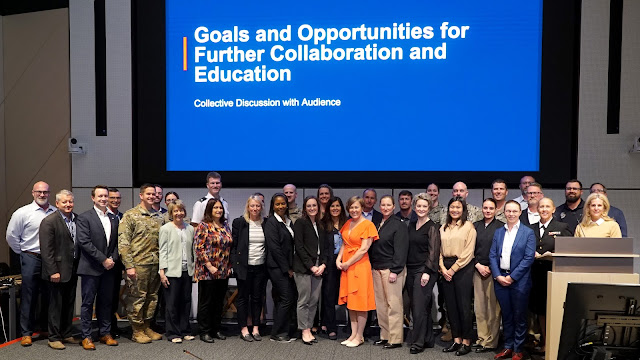Major League Baseball, U.S. Military Team Up for Performance Enhancing Substances Summit
USU's CHAMP and its OPSS program teamed up with Major League Baseball to host the inaugural Performance Enhancing Substances (PES) Summit on May 1.
 |
USU's CHAMP and its OPSS program teamed up with Major League Baseball to host the inaugural Performance Enhancing Substances (PES) Summit on May 1. (Photo courtesy of MLB) |
May 3, 2024 by Sarah Marshall
The Uniformed Services University’s (USU) Consortium for Health and Military Performance (CHAMP) and its Operation Supplement Safety (OPSS) program teamed up with Major League Baseball (MLB) to host the inaugural Performance Enhancing Substances (PES) Summit on May 1 at MLB headquarters in New York City.
The meeting brought together representatives from professional and collegiate athletic organizations, Service Members, athlete representatives, healthcare providers, and allied health professionals alongside those representing USU, the Department of Defense (DoD), the United States Anti-Doping Agency (USADA), United States Olympic and Paralympic Committee (USOPC), Department of Justice (DOJ), and Food and Drug Administration (FDA).
The PES Summit aims to raise awareness of issues surrounding prohibited substance use, identify and discuss emerging substances that pose health and safety risks, and propose potential solutions to maintain the safety, well-being and performance of athletes and Service Members.
“Service member use of performance-enhancing supplements is on the rise despite unclear benefits and safety concerns,” said Lt. Col. (Dr.) Chad Hulsopple, program director of the National Capital Consortium's Sports Medicine Fellowship, and associate professor of Family Medicine at USU. “Unregulated products can cause liver damage, drug interactions, and even death. To address this, a national summit brought together military and civilian experts to brainstorm solutions.”
At this one-day meeting, attendees received an overview on substance use/misuse in the military, heard from subject matter experts on the current state of PES, and learned about challenges faced by major sporting leagues and the DoD. Additionally, there were discussions on emerging and new substances that pose risks to all consumers.
Speaking on a panel entitled “Public Health Perspective – What are the Risks to Consumers?” Hulsopple expressed that there is a crucial need for a reliable system integrated into the health record for healthcare providers to advise soldiers, adding that “a national registry tracking adverse effects from supplements would improve understanding of their impact and promote informed choices.” Ultimately, Hulsopple explained that increased resources and funding are essential to empower service members and medical professionals to make sound decisions regarding supplement use.
The PES Summit promotes collaborations and campaigns; education approaches; and the identification of knowledge and research gaps. The end result includes a peer-reviewed publication with proposed educational and policy solutions along with a joint research agenda for execution.
“We are incredibly honored to co-host this event, which will be the first time that sport and military are coming together on this scale to collaborate on these important topics. Professional sports leagues and DoD face similar issues on prohibited substance use, and it will be a worthwhile exercise to bring these different perspectives together to share experiences and discuss potential solutions to these shared challenges,” said Jon Coyles, vice president for Drug, Health & Safety Programs, MLB.
“Through our work on the OPSS program, our collaborations allow us to draw attention to areas that need it- and our concentrated efforts on prevention, education and outreach on PES with our Service Members is paramount,” said Andrea Lindsey, director of the USU/CHAMP OPSS program and senior nutrition scientist for the Henry M. Jackson Foundation for the Advancement of Military Medicine. “We thank MLB for co-hosting this important landmark event to address this public health issue.”






